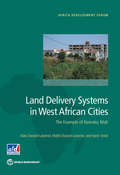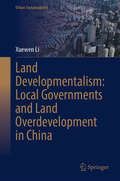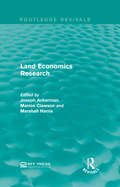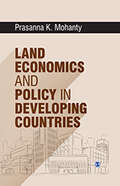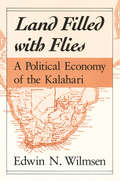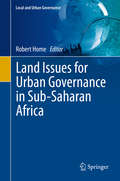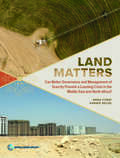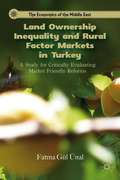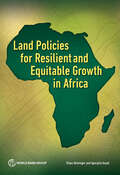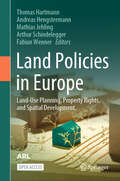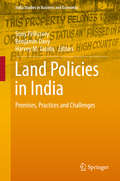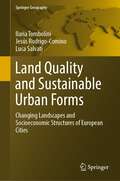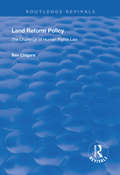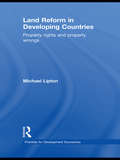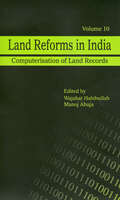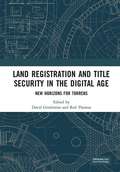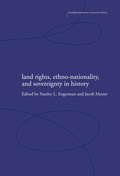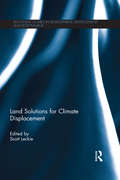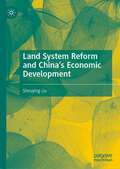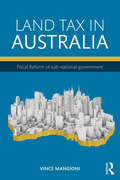- Table View
- List View
Land Delivery Systems in West African Cities
by Harris Selod Alain Durand-Lasserve Maã¿lis Durand-LasserveUrban and peri-urban land markets in rapidly expanding West African cities operate within and across different coexisting tenure regimes and involve complex procedures to obtain or make land available for housing. Because a structured framework lacks for the analysis of such systems, this book proposes a systemic approach and applies it to Bamako and its surrounding areas. The framework revolves around the description of land delivery channels: starting from the status of tenure when the land is first placed in circulation for residential use, it identifies the processes whereby tenure can be improved, the types of transactions that take place along the way, and interactions between land delivery channels. The analysis of the system shows that land is initially provided through a customary land delivery channel--which predominates in peri-urban areas where land is being transformed from agricultural to residential use--and through a public and para-public channel, which involves the administrative allocation of residential plots to inhabitants and the transfer of land to developers. These two channels feed into the formal private channel which delivers serviced plots with ownership title at much higher prices. Plots in the various channels may be traded successively, with a degree of informality varying according to tenure, legality and registration of transactions. Whereas the development of the formal market is hindered by structural factors, the informal land market provides little tenure security. Targeted towards low and middle-incomes, it also attracts wealthy and well-connected buyers who have access to information and administrative and political power and can more easily formalize tenure. The sustained increase in land prices, numerous conflicts over land, high transaction costs and time-consuming formalization procedures, together with the involvement of a large number of stakeholders, combine to reduce affordability significantly and make access to secure land very difficult for the urban poor.
Land Developmentalism: Local Governments and Land Overdevelopment in China (Urban Sustainability)
by Xuewen LiThis book examines the strategies adopted by local governments to obtain excess construction land quotas in the face of the central government’s strict land management system. It applies game theory, principal-agent theory, collective action theory, and competition and collusion theory to analyze the trade-offs and constraints faced by local governments under the existing institutional framework. It also empirically tests the imitative competitive strategy of land violation and the institutional collusion strategy of land development rights trading using spatial panel model and Tobit model. The book reveals the internal mechanism behind local governments’ simultaneous adoption of competitive and collusive strategies in pursuing local interests and economic growth. It also shows how local governments’ land violations have significant strategic characteristics in time and space, and how economic development gap, resource endowment gap, and human network relationship influence their collusion formation in land development rights trading. This book is a valuable contribution to the literature on land management, local governance, and political economy in China. It is suitable for scholars, students, policy makers, and practitioners who are interested in understanding the complex dynamics of land development in China. The book is written in an accessible and engaging style, with clear explanations of theoretical concepts and empirical methods.
Land Economics Research: Papers Presented At A Symposium Held At Lincoln, Nebraska, June 16-23, 1961 (Routledge Revivals)
by Marshall Harris Marion Clawson Joseph AckermanOriginally published in 1962, Land Economics Research brings together papers presented at a symposium in Nebraska in 1961 which deal with ideas, theories and suggestions in land economics to encourage problem-solving in American land issues. This report draws on all types of land, all situations and all economics problems related to land issues. This title will be of interest to students of Environmental Studies and Economics as well as professionals.
Land Economics and Policy in Developing Countries
by Prasanna K MohantyLand economics is grossly neglected in developing countries, including India. The disconnect between land use planning through master plans and land economics is glaring. Master planning has led to an acute scarcity of serviced land and floor space for economic growth and affordable housing. It has resulted in sprawl, housing–employment mismatch, environmental degradation, social exclusion, rent-seeking and deadweight welfare losses. Land Economics and Policy in Developing Countries delves into theory and practice of land economics to draw lessons for land policy and management. It presents concepts and perspectives of land, functioning of land markets, determinants of location and land use, fallacies of comprehensive land use planning, sustainable land management design, land-based financing of infrastructure and land policy reforms in developing countries. This book evaluates land policy and national urban strategy frameworks, and suggests directions for broader reforms in urban planning, financing and governance.
Land Filled with Flies: A Political Economy of the Kalahari
by Edwin N. Wilmsen"The image of a pristine isolation has been almost as common in research on foragers as in the popular media. Land filled with Flies is a sustanined argument against such views. Wilmsen marshals an enormous quantity of historical, archival, archeological, ethnographic, and survey data on the Kalahari Zhu to show how far from the reality these images are, how they have their own historical provenance, how they have been analytically distorting, and how they have proven politically pernicious for living groups like the Zhu."—Pauline Peters, Science "[A] major work. . . . Anthropologists will, and should, use Wilmsen's meticulously detailed study to revise their early lectures in the introductory course, and no future study of African 'foragers' should ignore it."—Parker Shipton, American Anthropologist "An impressive book. . . . The reader need only read the first few pages to judge both the quality and ambitiousness of the work. . . . Essential reading."—David R. Penna, Africa Today
Land Issues for Urban Governance in Sub-Saharan Africa (Local and Urban Governance)
by Robert HomeSub-Saharan Africa faces many development challenges, such as its size and diversity, rapid urban population growth, history of colonial exploitation, fragile states and conflicts over land and natural resources. This collection, contributed from different academic disciplines and professions, seeks to support the UN Habitat New Urban Agenda passed at Habitat III in Quito, Ecuador, in 2016. It will attract readers from urban specialisms in law, geography and other social sciences, and from professionals and policy-makers concerned with land use planning, surveying and governance.Among the topics addressed by the book are challenges to governance institutions: how international development is delivered, building land management capacity, funding for urban infrastructure, land-based finance, ineffective planning regulation, and the role of alternatives to courts in resolving boundary and other land disputes. Issues of rights and land titling are explored from perspectives of human rights law (the right to development, and women's rights of access to land), and land tenure regularization. Particular challenges of housing, planning and informality are addressed through contributions on international real estate investment, community participation in urban settlement upgrading, housing delivery as a partly failing project to remedy apartheid's legacy, and complex interactions between political power, money and land. Infrastructure challenges are approached in studies of food security and food systems, urban resilience against natural and man-made disasters, and informal public transport.
Land Matters: Can Better Governance and Management of Scarcity Prevent a Looming Crisis in the Middle East and North Africa?
by Harris Selod Anna CorsiAcross the Middle East and North Africa (MENA), land is scarce and valuable. Demand for land is projected to dramatically increase to meet the needs of a fast-growing urban population. At the same time, the supply of land is restricted by weak governance and climate factors, causing the quasi-exhaustion of cultivable land reserves. As a result, a crisis is looming. Yet, land continues to be used inefficiently, inequitably, and unsustainably. 'Land Matters' identifies and analyzes the economic, environmental, and social challenges associated with land in the MENA region, shedding light on policy options and proposing paths to reform. It concludes that MENA countries need to act promptly, think more holistically about land, reassess the strategic trade-offs, and minimize land distortions. This report promotes a culture of open data, transparency, and inclusive dialogue on land, while filling major data gaps. These important steps will contribute to renewing the social contract, transforming the region economically and digitally, improving women's land rights, and facilitating recovery and reconstruction in a context of dramatic social, political, and climatic transformation.
Land Ownership Inequality and Rural Factor Markets in Turkey: A Study for Critically Evaluating Market Friendly Reforms (The Economics of the Middle East)
by Fatma Gül ÜnalÜnal uses Turkey as a case study to investigate the effectiveness and efficiency of land and labor markets in spreading economic opportunities within agriculture and its ability to reduce rural poverty.
Land Policies for Resilient and Equitable Growth in Africa
by Klaus Deininger Aparajita GoyalLand institutions and policies will be critical to help African countries respond to the challenges of climate change, urban expansion, structural transformation, and gender equality. Together, they affect urban dwellers’ ability to access productive jobs, live in decent housing, and breathe clean air; farmers’ and women entrepreneurs’ capacity to insure against shocks, increase productivity, and diversify income sources; and governments’ ability to plan, tax property to provide services, and manage public land in a way that provides sustained local benefits by attracting investment, including via climate finance. Land Policies for Resilient and Equitable Growth in Africa draws on a wealth of data, examples, and studies from Africa and beyond to show that regulatory and institutional reforms can harness this potential by improving quality, coverage, usefulness, and sustainability of documented land rights. By identifying viable reforms with transformative potential that fully harness digital opportunities, this book provides practical guidance to governments seeking to enhance their land institutions’ performance; to their partners supporting such reform; and to policymakers, land professionals, scholars, and civil society aiming to lay the foundations for Africa to better utilize its economic, human, and ecological potential. --------------- This volume provides an essential reference, based on an impressive review of the literature on land issues in Africa and an exhaustive account of policies and policy experiments aimed to promote the efficient use of this key resource for the development of the continent. -- François Bourguignon, Professor Emeritus, Paris School of Economics Many African governments will find this report highly useful. It is full of little-known successes and practical ways by which they can improve their land policies by harnessing new technologies. Africa’s urban population will rapidly triple: clarifying land rights is an urgent priority in building the successful cities of the future. By 2050, if the inherited policies of the past were retained, today’s youth would be struggling in unliveable mega-slums. -- Sir Paul Collier, Professor of Economics and Public Policy, Oxford University This is an excellent study that combines insights from years of research with practical insights for policy and action on the ground. -- Jyotsna Puri, Associate Vice President, Strategy and Knowledge, International Fund for Agricultural Development Land institutions affect the effective use of land but also the functioning of credit, labor, and product markets. Nowhere are these issues more relevant than in Africa, and this report is important and timely. -- Johan Swinnen, Director General, International Food Policy Research Institute This report illustrates how legal and institutional reforms that capitalize on digital opportunities can strengthen land institutions and policies to optimize land use, enhance people’s rights, narrow gender disparities, and catalyze structural transformation in a manner that aligns with the continent’s distinctive context and serve as a pivotal instrument for social and economic advancement. -- Maximo Torero, Chief Economist, Food and Agriculture Organization
Land Policies in Europe: Land-Use Planning, Property Rights, and Spatial Development
by Thomas Hartmann Andreas Hengstermann Mathias Jehling Arthur Schindelegger Fabian WennerLand is a scarce resource. How can conflicting claims to land be reconciled? How can more housing be provided and, at the same time, the ecological goal of reducing land take be met? In many European countries, land-use planning is facing increasing and oftentimes contradictory challenges. This forms a land question, which requires land policies that can deal with the fraught relationship between planning and private property rights. A legislativereflex is to adapt planning laws. Oftentimes, such changes lack a deeper reflection of land policy and its implications. Especially an international comparison can foster a structured reflection of the own land policy.This thought-provoking book compiles a remarkable collection of 12 cases unveiling how land policies work. Curated by leading experts in the field, it takes the reader on a journey through the multifaceted realm of land policies across the continent. This book offers valuable insights into the complex interplay between land use, and property rights. "Land Policies in Europe" isn't just a book; it's a conversation starter equally relevant for experienced academics or young students, policymakers, and practitioners. This is an open access book.
Land Policies in India: Promises, Practices and Challenges (India Studies in Business and Economics)
by Sony Pellissery Benjamin Davy Harvey M. JacobsThis book examines how property rights are linked to socio-economic progress and development. It also provides a theoretical analysis, an economic/social analysis of planning, case studies of the implementation of planning and regulation instruments, practices related to law and planning, analysis of case laws in a particular segment. The interconnection between property, law and planning is a running theme throughout the book. The land question has been central to South Asian development on two counts: First, although the majority of the population relies on agriculture and allied activities their livelihood, landholding is highly skewed; second, urban planning is facing unprecedented challenges due to bourgeoning property values as well as gush of migrants to cities seeking livelihood. The response to these challenges in the form of laws and policies has been very large compared to the academic attention that is received. However, the measures emerging from planning and policies have had limited impact on the extent of the problems. This paradox calls for serious introspection and academic engagement that this book undertakes. The book further deals with the emerging discipline of planning law, which determines property value and use, and argues that regulatory issues of public policy determine the property valuation and property pricing.
Land Quality and Sustainable Urban Forms: Changing Landscapes and Socioeconomic Structures of European Cities (Springer Geography)
by Ilaria Tombolini Jesús Rodrigo-Comino Luca SalvatiIn the panorama of studies related to the ability of lands to support both natural processes and agricultural production activities, this research introduces a still unexplored or under-studied theme which is that of the relationship between urban sprawl in its various forms and land quality.The first part of the book is dedicated to the motivations and the theoretical premises from which the research originates, connected to the concept of land and those of sustainable urban form. The second part concerns the complex path towards a sustainable use of land, both in terms of institutional and regulatory measures, and in terms of knowledge and understanding of soil degradation processes. This research focuses on the Mediterranean area which is discussed in more detail in the third part. In this part of Europe we try to establish relationships between settlement dynamics and land quality: here fragile ecosystems are diffused both from a biological point of view. physical as well as socio-economic, here we find landscapes that are particularly sensitive to land degradation processes (subject to land degradation, considered the antipodes of land quality) and which in recent decades have been particularly affected by anthropic pressure.In the fourth part, an analysis is presented concerning 76 metropolitan areas representative of southern Europe. The methodology used in this analysis is based on the relationship that exists between soil sealing (or soil waterproofing) and land degradation (or land degradation) aimed at an interpretation, at the metropolitan scale, of how in southern Europe the pattern of Urbanization (compact, dispersive, intermediate) affects the land's ability to support both natural processes and agricultural production activities in a diversified way. In particular, the data on land quality and data on land use were considered together in order to analyze the processes of urban growth and the occupation of productive land for a very large area that includes Greece, France, Italy, Spain, Portugal and some parts of the Adriatic coast.There is still a long way to go, in terms of sharing, integration and definition of strategies aimed at achieving certain targets. A necessary and innovative look towards land quality could help to consider the protection of the soil as a whole, even at the planning level.
Land Reform Policy: The Challenge of Human Rights Law (Routledge Revivals)
by Ben ChigaraOriginally published in 2004. The book examines the possibility of resolving past and continuing social injustices that are rooted in colonial or some such other similar experience of states from a variety of perspectives. First the issue is examined from an international law perspective, which evaluates the validity of counter claims to title to land in affected SADC states. Secondly the issue is examined from a human rights perspective, which privileges promotion for the respect of the inherent dignity of all persons. Thirdly, the issue is examined from victimology and psychology schools of thought in order to understand both the effect and impact on stakeholders of the operative dynamics in conflicts that arise from long standing social injustices that are connected to colonial or some such other similar historical experience of States. The book proposes humwefficiency as a model for resolution of this type of conflict. This model targets preservation of the inherent dignity of all stakeholders by combining international human rights morality with local intuition about land ownership and use. In this sense, the book takes human rights theory beyond politics and utopia, and applies it to foster new social engineering technologies for the resolution of social injustices and promotion of social justice. This is justified by the fact that the human rights culture has evolved in a considerably short period of time to become the dominant culture of the world.
Land Reform in Developing Countries: Property Rights and Property Wrongs (Priorities for Development Economics)
by Michael LiptonLand reforms are laws that are intended, and likely, to cut poverty by raising the poor’s share of land rights. That raises questions about property rights as old as moral philosophy, and issues of efficiency and fairness that dominate policy from Bolivia to Nepal. Classic reforms directly transfer land from rich to poor. However, much else has been marketed as land reform: the restriction of tenancy, but also its de-restriction; collectivisation, but also de-collectivisation; land consolidation, but also land division. In 1955-2000, genuine land reform affected over a billion people, and almost as many hectares. Is land reform still alive, for example in Bolivia, South Africa and Nepal? Or is it dead and, if so, is this because it has succeeded, or because it has failed? There has been massive research on land reform and this book builds on some surprising findings. Small farms’ share in land is rising in most of Asia and Africa. This is not driven (as widely claimed) by growth in rural population or farm productivity, but by the relative efficiency of small farms, and in some cases by land reform. Whether land reform helps the poor depends not only on land transfers, but at least as much on its effects through employment, non-farm activity, GDP growth and distribution, as well as the village status and power of the poor. Avoidance, evasion and even distortion of land reform laws sometimes advance their main aims. Liberalisation and its accompaniments (such as supermarkets) can be powerful friends or fatal foes of small farms and land reform. This book will be of great interest to students, researchers and consultants working on agriculture, farm organisation, rural development and poverty reduction, with special emphasis on developing countries.
Land Reforms in India: Computerisation of Land Records (Land Reforms in India series)
by Wajahat Habibullah and Manoj AhujaThis is the tenth volume in a major series which studies the status of land reforms throughout the country. It examines the progress achieved and the difficulties encountered in the computerisation of land records in various states. In 1988, the central government sponsored the Computerisation of Land Records (CoLR) scheme to tackle the recurring problems thrown up by inadequate land records system. Providing a critical appraisal of CoLR, the 20 articles in the volume are divided into three sections: Computerisation of Land Records; Digitisation of Cadastral Maps; and Land Information System. Based on empirical data and field studies, this volume is an important contribution towards understanding the socio-economic realities and social dynamics of contemporary India in the framework of land reforms.
Land Registration and Title Security in the Digital Age: New Horizons for Torrens
by David Grinlinton Rod ThomasThis book examines the current state of, and emerging issues in relation to, the Torrens and other systems of land registration, and the process of automation of land registration systems in jurisdictions where this is occurring worldwide. It analyses the impacts of advances in digital technology in this area and includes contributions from of a number of experts and leaders in this subject from a number of jurisdictions. While it has an Australasian bias, there are important chapters outlining current challenges and developments in Scotland, England and Wales, Ireland, and the Netherlands. The book will be relevant to those engaged in land registration and conveyancing processes, including, but not limited to, property law practitioners and conveyancers, academics in this field, government and public policy experts, law and property students, and IT and IP experts, especially those working on developing automated land registration systems.
Land Rights in India: Policies, movements and challenges
by Varsha Bhagat-GangulyThis volume engages with the topical issue of land rights in neoliberal India. It examines government policies, laws, land governance and land reforms from the perspective of social justice and people’s response to dispossession of land. Looking beyond the dominant discourse of land acquisition and the conception of land as a commodity for economic growth, the book explores critical themes including issues of social identity, culture, livelihood and food security through a study of land reform; reviews existing land policies and legal dimensions; and discusses issues and challenges of land governance and land dependents as well as perspectives from people’s movements. Lucidly written, based on empirical research, and comprehensive in its treatment of a contentious concern, this volume will be useful to scholars and researchers of economics and public policy, development studies, political science, and political economy. It will also interest scholars of South Asian studies and sociology.
Land Rights, Ethno-nationality and Sovereignty in History (Routledge Explorations in Economic History)
by Stanley L. Engerman Jacob MetzerThe complex relationships between ethno-nationality, rights to land, and territorial sovereignty have long fed disputes over territorial control and landed rights between different nations, ethnicities, and religions. These disputes raise a number of interesting issues related to the nature of land regimes and to their economic and political implications. The studies drawn together in this key volume explore these and related issues for a broad variety of countries and times. They illuminate the diverse causes of ethno-national land disputes, and the different forms of adjustment and accommodation to the power differences between the contesting groups. This is done within a framework outlined by the editors in their analytical overview, which offers contours for comparative examinations of such disputes, past and present. Providing conceptual and factual analyses of comparative nature and wealth of empirical material (both historical and contemporary), this book will appeal to economic historians, economists, political scientists, sociologists, anthropologists and all scholars interested in issues concerning ethno-nationality and land rights in historical perspective.
Land Rights, Ethno-nationality and Sovereignty in History (Routledge Explorations in Economic History)
by Stanley L. Engerman Jacob MetzerThe complex relationships between ethno-nationality, rights to land, and territorial sovereignty have long fed disputes over territorial control and landed rights between different nations, ethnicities, and religions. These disputes raise a number of interesting issues related to the nature of land regimes and to their economic and political implications.The studies drawn together in this key volume explore these and related issues for a broad variety of countries and times. They illuminate the diverse causes of ethno-national land disputes, and the different forms of adjustment and accommodation to the power differences between the contesting groups. This is done within a framework outlined by the editors in their analytical overview, which offers contours for comparative examinations of such disputes, past and present.Providing conceptual and factual analyses of comparative nature and wealth of empirical material (both historical and contemporary), this book will appeal to economic historians, economists, political scientists, sociologists, anthropologists and all scholars interested in issues concerning ethno-nationality and land rights in historical perspective.
Land Rover North America, Inc.
by Susan FournierCharles Hughes, president and CEO of Land Rover North America, Inc., is debating product positioning options for the new Land Rover Discovery. The positioning decision must consider the role of the Discovery vis-`a-vis other vehicles in the LRNA line, the brand's strengths and weaknesses versus competition, and the positioning of the Land Rover umbrella brand in the U.K. An allocation of marketing funds across brands and mix elements must also be determined and decisions on the company's innovative retailing strategy and experience marketing initiatives made. The case contains rich consumer behavior data. Includes color exhibits.
Land Securities Group (A): Choosing Cost or Fair Value on Adoption of IFRS
by Edward J. RiedlA U.K. real estate firm, required to adopt international accounting standards (IAS) by 2005, must change the reporting of its primary asset (investment property) from the revaluation model under U.K. GAAP to either the cost or fair-value model under IAS. This would have a number of effects on European investment property firms, including Land Securities.
Land Solutions for Climate Displacement (Routledge Studies in Development, Displacement and Resettlement)
by Scott LeckieThe threat of climate displacement looms large over a growing number of countries. Based on the more than six years of work by Displacement Solutions in ten climate-affected countries, academic work on displacement and climate adaptation, and the country-level efforts of civil society groups in several frontline countries, this report explores the key contention that land will be at the core of any major strategy aimed at preventing and resolving climate displacement. This innovative and timely volume coordinated and edited by the Founder of Displacement Solutions, Scott Leckie, examines a range of legal, policy and practical issues relating to the role of land in actively addressing the displacement consequences of climate change. It reveals the inevitable truth that climate displacement is already underway and being tackled in countries such as Bangladesh, Kiribati, Papua New Guinea, Solomon Islands, Tuvalu and the United States, and proposes a series of possible land solution tools that can be employed to protect the rights of people and communities everywhere should they be forced to flee the places they call home.
Land System Reform and China’s Economic Development
by Shouying LiuThis book brings one of China’s most renowned economists’ views on systemic reform of the land system- the pillar of China’s economic growth. This book goes through the fundamental logic of China’s land system reform and introduces the methods the author uses to study land system. Specifically, this book covers topics ranging from the logic of China’s land system reform, including China’s rural land system reform and China’s land expropriation system reform, to the relationship between China’s urbanization and land system reform. This book is an invaluable introduction to China’s land system, and to its economy more broadly.
Land Tax in Australia: Fiscal reform of sub-national government
by Vince MangioniLand Tax in Australia demonstrates how land tax operates and is administered across State and local governments in Australia. International expert Vincent Mangioni reviews the current status and emerging trends in these taxes in Australia and compares them with the UK, USA, Canada, Denmark and New Zealand. Using substantial original research, the author sets out what Australia must do through practice and policy to reform and bring this tax into the 21st Century. <P><P>The need for fiscal reform and strengthening the finances of Australia’s sub-national government is long overdue. These reforms aim to minimise the taxpayer revolts encountered in previous attempts at land tax reform, while improving tax effort in line with other advanced OECD countries. <P><P>This book provides an essential resource for all property professionals working in development, valuation, law, investment, as well as accountants, tax economists and government administrators. It is highly recommended for students on property, taxation, legal and social science courses.
